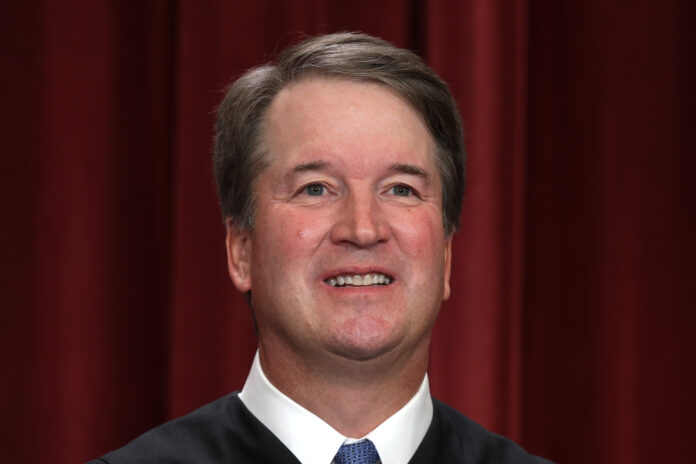Justice Brett Kavanaugh’s questioning of the obstruction charges brought against a January 6 defendant has sparked anger on social media.
On Tuesday the Supreme Court heard arguments over a charge of obstruction of an official proceeding in the case of Joseph Fischer, a former Pennsylvania police officer who has been indicted for his role in disrupting Congress’ certification of Joe Biden’s presidential victory over Donald Trump.
The court’s conservative justices signaled that they could upend hundreds of the criminal charges brought against those who participated in the riot at the U.S. Capitol on January 6, 2021. A favorable ruling could also affect the prosecution of Trump, who faces the same obstruction charge in a separate case brought by special counsel Jack Smith.
Conservative justices, who form a 6-3 majority on the court, expressed concerns about the decision by prosecutors to apply the anti-obstruction provision of the 2002 Sarbanes-Oxley Act, which was passed in response to the financial scandal that brought down energy company Enron Corp, to Fischer’s case.
“There’s six other counts in the indictment here. … Why aren’t those six counts good enough?”
— SCOTUS Justice Brett Kavanaugh questions why the DoJ wants to charge some January 6 rioters with obstructing an official proceeding, which could carry more prison time pic.twitter.com/JvlyMnwuPi
— The Recount (@therecount) April 16, 2024
Lawyers for Fischer argue the provision was meant to close a loophole in criminal law and discourage the destruction of records in response to an investigation and had never been used to prosecute anything besides evidence tampering until the Capitol riot.
During oral arguments, conservative justices questioned whether federal prosecutors went too far by applying the statute to the Capitol attack and said the law was so broad that it could even be used against peaceful protesters.
And Kavanaugh questioned whether the obstruction charge was necessary given the range of other criminal counts brought against Fischer.
“There are six other counts in the indictment here, which include civil disorder, physical contact with the victim, assault, entering and remaining in a restricted building, disorderly and disruptive conduct, disorderly conduct in the Capitol building,” he said.
“And why aren’t those six counts good enough just from the Justice Department’s perspective given that they don’t have any of the hurdles?”
Solicitor General Elizabeth Prelogar, the Biden administration’s top Supreme Court lawyer, responded that the other charges do not “fully reflect the culpability” of Fischer’s conduct.
Alex Wong/Getty Images
“He had said in advance of January 6 that he was prepared to storm the Capitol, prepared to use violence, he wanted to intimidate Congress,” Prelogar said. “He said they can’t vote if they can’t breathe. And then he went to the Capitol on January 6 with that intent in mind and took action, including assaulting a law enforcement officer.
“That did impede the ability of the officers to regain control of the Capitol and let Congress finish its work in that session. And I think it’s entirely appropriate for the government to seek to hold Petitioner accountable for that conduct with that intent.”
Kavanaugh’s question prompted criticism on social media, with some saying that justices do not decide what charges prosecutors bring against defendants.
“That’s not how this works, sir. If you’ve got five people murdered and you just charge four, is that proper?” one person wrote on X, formerly Twitter.
“I mean, ‘why aren’t those four counts good enough?’ The arguments from the conservative side of the bench are really straining credulity today.”
Another person wrote: “Is that how the law works when you have Republican SCOTUS justices acting as your defense attorney? There’s a limit to the number of charges you can face no matter how many crimes you commit?”
Another wrote that it “may be the single dumbest and most irrelevant question I have ever heard a Supreme Court Justice ask. ‘You charged the defendant with murder and 1st degree burglary. Was the armed robbery charge really necessary?'”
A decision in the case is expected by late June.
Uncommon Knowledge
Newsweek is committed to challenging conventional wisdom and finding connections in the search for common ground.
Newsweek is committed to challenging conventional wisdom and finding connections in the search for common ground.


